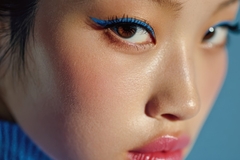Algae-based sunscreen: Study unveils potential for sustainable and natural SPF

A study has found that algae has photoprotective agents, making it suitable for natural sunscreen formulations without harming the environment. A proposed formulation used in the research holds the potential to provide a sustainable alternative for next-generation sun care products.
Marine macro-algae were found to be rich in UV-absorbing bioactives, and the combination of red and brown algae in a nanoemulsion platform showed efficiency in delivering photoprotection.
The authors say the impact of climate change, especially the depletion of the ozone layer, is leading to increased UV radiation levels. This concern heightens the need for sustainable and effective sunscreens.
 Algae have developed biochemical survival mechanisms, including photoprotective compounds.Blue beauty
Algae have developed biochemical survival mechanisms, including photoprotective compounds.Blue beauty
Marine algae inhabit aquatic environments and are therefore exposed to high levels of sunlight. Through their evolution, they have developed biochemical survival mechanisms, including photoprotective compounds, meaning they thrive in high UV exposure.
The nanoemulsion exhibited a critical wavelength of 379 nm, which aligns with the Skin Cancer Foundation’s recently published recommendations for UV exposure. The wavelength measures the ability to provide a certain amount of SPF protection.
The study results, published in Cosmetics, reveal science-backed evidence of marine-derived sun care technologies by integrating biodiversity, nanotechnology, and sustainable formulation science. The study also details that future work is necessary to use marine algae for cosmetic applications, such as the effect of the formulation on a cellular level.
Moreover, it highlights the need for future texture profile analysis and long-term stability studies to better understand the formulation’s performance when applied to the skin.
“This work contributes to the expanding field of marine-derived photoprotectants, offering a promising alternative aligned with ‘blue beauty’ and environmentally conscious formulation strategies,” says the study.
The blue beauty movement refers to the emergence of novel marine-based ingredients for the personal care industry. Experts previously predicted that algae-derived ingredients will drive the cosmetics industry in the years ahead, as it focuses on environmental and ocean conservation and the conscious use of ingredients and cosmetics packaging.
 The industry highlights algae as having great potential for various skin care applications. Algae-based skin care
The industry highlights algae as having great potential for various skin care applications. Algae-based skin care
AmorePacific recently released studies demonstrating the skin-regenerative effects of an algae-derived polydeoxyribonucleotide (PDRN) widely used in skin care treatments, especially in Korea. The company explained that PDRN is usually derived from fish DNA, but using an algae-derived version is more easily scalable and, thus, more sustainable and ethical than animal-based alternatives.
In April, Swedish Algae Factory raised €3 million (US$3.3 million) to accelerate its market expansion of Algica, a natural product made from algae’s high-tech silica shell. The multi-functional skin care ingredient is used globally in over 60 products. The company said the ingredient can carry other active substances and efficiently absorb nutrients, vitamins, bacteria, sweat, oil, and impurities.
Personal Care Insights recently sat down with Givaudan Active Beauty to discuss its algae-derived anti-aging ingredient, designed to provide preventive and corrective benefits, such as improving elasticity, tone, and overall skin appearance.













